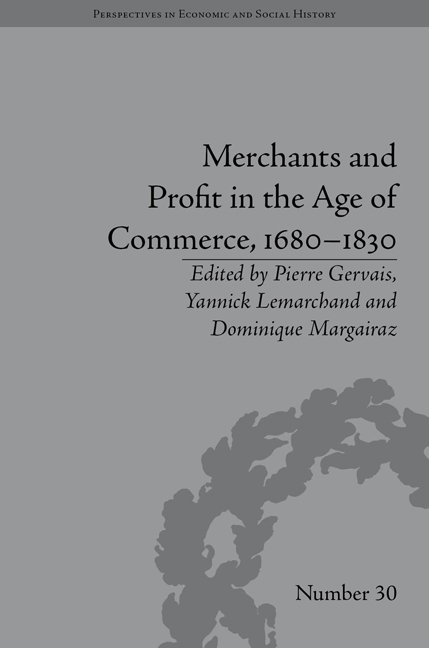Book contents
- Frontmatter
- CONTENTS
- Acknowledgements
- List of Contributors
- List of Figures and Tables
- Introduction: The Many Scales of Merchant Profit: Accounting for Norms, Practices and Results in the Age of Commerce
- Part I Understanding Merchant Transactions
- Part II The Credit Nexus and its Pitfalls
- Part III Beyond Price Signals: The Institutional Framework
- Part IV Diversification and Risk Management
- 7 The Pinet Family of Gap and their Business Relations, 1785–1816: Official Activities and the Issue of Commercial Risk
- 8 ‘The Way to Make a Huge Fortune, Easily and Without Risk’: Economic Strategy and Tactics among Tobacco-South Planters in the Early National United States
- Conclusion: Reorienting Early Modern Economic History: Merchant Economy, Merchant Capitalism and the Age of Commerce
- Notes
- Index
8 - ‘The Way to Make a Huge Fortune, Easily and Without Risk’: Economic Strategy and Tactics among Tobacco-South Planters in the Early National United States
from Part IV - Diversification and Risk Management
- Frontmatter
- CONTENTS
- Acknowledgements
- List of Contributors
- List of Figures and Tables
- Introduction: The Many Scales of Merchant Profit: Accounting for Norms, Practices and Results in the Age of Commerce
- Part I Understanding Merchant Transactions
- Part II The Credit Nexus and its Pitfalls
- Part III Beyond Price Signals: The Institutional Framework
- Part IV Diversification and Risk Management
- 7 The Pinet Family of Gap and their Business Relations, 1785–1816: Official Activities and the Issue of Commercial Risk
- 8 ‘The Way to Make a Huge Fortune, Easily and Without Risk’: Economic Strategy and Tactics among Tobacco-South Planters in the Early National United States
- Conclusion: Reorienting Early Modern Economic History: Merchant Economy, Merchant Capitalism and the Age of Commerce
- Notes
- Index
Summary
Introduction
As historians of colonial British America have shown, the essentially rural, agricultural economy of the Chesapeake region, comprising upper North Carolina, Virginia, Maryland and lower Delaware, depended on Atlantic commerce. While some have argued that the regional staple crop of tobacco exhausted the land, and indebtedness to British merchants further eroded entrepreneurial energies by the late colonial era, others, more recently, have portrayed a generally prosperous economy, at least for larger planters. So, while tobacco cultivation was replaced by wheat farming in parts of the eastern and northern Chesapeake in the late eighteenth century, and even more extensively and rapidly during and after the American revolutionary war, the tobacco south was actually growing larger, expanding in the late eighteenth and early nineteenth centuries into swathes of Kentucky and Tennessee. Indeed, tobacco was temptingly profitable enough that, once American Independence annulled the Navigation Acts and freed planters from dependence on the merchant houses of Glasgow and London, freeing them to seek out the most profitable markets, some became merchants full-time and more became part-time merchants. Also, planters filled the gap left by resident Scottish factors in the Chesapeake, buying up tobacco and other produce from poorer farmers and selling that on too.
On the face of it, then, profit-oriented tobacco planters seem to have conformed to modern notions of classical rational-choice economic behaviour.
- Type
- Chapter
- Information
- Merchants and Profit in the Age of Commerce, 1680–1830 , pp. 153 - 170Publisher: Pickering & ChattoFirst published in: 2014



